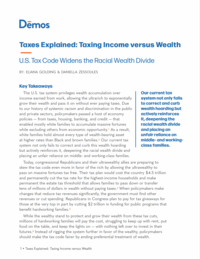Key Takeaways
The U.S. tax system privileges wealth accumulation over income earned from work, allowing the ultrarich to exponentially grow their wealth and pass it on without ever paying taxes. Due to our history of systemic racism and discrimination in the public and private sectors, policymakers passed a host of economy policies – from taxes, housing, banking, and credit – that enabled mostly white families to accumulate massive fortunes while excluding others from economic opportunity. As a result, white families hold almost every type of wealth-bearing asset at higher rates than Black and brown families. Our current tax system not only fails to correct and curb this wealth hoarding but actively reinforces it, deepening the racial wealth divide and placing an unfair reliance on middle- and working-class families.
Today, congressional Republicans and their ultrawealthy allies are preparing to skew the tax code even more in favor of the rich by allowing the ultrawealthy to pass on massive fortunes tax free. Their tax plan would cost the country $4.5 trillion and permanently cut the tax rate for the highest-income households and make permanent the estate tax threshold that allows families to pass down or transfer tens of millions of dollars in wealth without paying taxes. When policymakers make changes that reduce tax revenues significantly, the government must find other revenues or cut spending. Republicans in Congress plan to pay for tax giveaways for those at the very top in part by cutting $2 trillion in funding for public programs that benefit hardworking families.
While the wealthy stand to protect and grow their wealth from these tax cuts, millions of hardworking families will pay the cost, struggling to keep up with rent, put food on the table, and keep the lights on – with nothing left over to invest in their futures. Instead of rigging the system further in favor of the wealthy, policymakers should make the tax code fairer by ending preferential treatment of wealth. Adequately taxing wealth would not only help curb extreme wealth concentration but also raise revenue that should be invested in public goods that enable everyone, particularly Black and brown people who have been excluded from economic opportunity, a real shot at financial stability and economic mobility.
Get the full PDF
Background
Why is this relevant right now?
During his first administration, President Trump and Republican members of Congress cut taxes for wealthy households in a major tax reform bill called the Tax Cuts and Jobs Act (TCJA) that did very little for households with low or moderate incomes. As an example, households in the top 1 percent of earners (with incomes over $3 million) will have an average tax cut of over $60,000 in 2025, according to an analysis from the Tax Policy Center. In contrast, households earning less than $84,000 a year will have, on average, a tax cut of less than $500.[ii] Some elements of that bill, including tax cuts for the ultrawealthy, are set to expire at the end of 2025. President Trump and Republicans want to make these tax cuts permanent, skewing the tax code even further to benefit the wealthy.
The TCJA temporarily doubled the estate tax exemption: Before the TCJA, an individual could pass down $5.5 million ($11 million for a couple) to an heir tax free. Starting in 2018, the law allowed a couple to pass down $22 million in wealth without paying taxes. Because the estate tax exemption increases with inflation, a couple can now pass on nearly $28 million tax free to their heirs. That law also temporarily lowered the income tax rate for the highest-income households. Congressional Republicans want to make these provisions permanent or even eliminate the estate tax entirely. Extending these and other provisions from the TCJA will make the rich richer while widening the wealth divide. These extensions would cost the country $466 billion in revenue in 2026, money that should be invested in public goods that benefit everyone, not just the ultrawealthy.
Read more about how the U.S. tax system privileges wealth over income earned from work and how a fairer tax code could shrink the racial wealth divide

